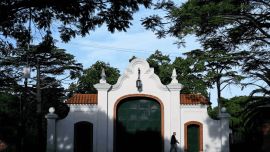Extended over 7.5 million acres and four provinces – Neuquén, Mendoza, Río Negro and La Pampa – Vaca Muerta is the world’s second-largest shale oil and gas deposit.
The site is integral to Argentina’s plans – experts say its development could both satisfy domestic energy production demands and significantly boost the economy, a potentially vital lifeline for the country at a time of recession and economic turmoil.
The unconventional hydrocarbon deposit has attracted interest from many local and international energy companies, as the government seeks to attract investment.
Qatar is no exception. In the wake of emir Tamim bin Hamad Al Thani’s visit to Latin America last week, topping the leader’s agenda is the approval of a bilateral investment agreement that will allow the country to bypass Argentina’s double taxation system, a key factor in the negotiations over Vaca Muerta.
Al Thani’s visit to Buenos Aires was the second in two years and his relationship with the president and Argentina goes beyond diplomacy: the emir is the owner of extensive lands in Patagonia and, under his government, Qatar Airways has sealed a five-year sponsorship deal with Boca Juniors – the football club once led by Mauricio Macri.
In June state-owned Qatar Petroleum, the world’s largest producer of liquefied natural gas, signed an agreement with Exxon Mobil to acquire a 30-percent stake in two of the company’s hydrocarbon affiliates in Argentina – ExxonMobil Exploration Argentina SRL and Mobile Argentina SA.
Both affiliates hold rights for seven blocks in the Neuquén province under “unconventional exploration licences with active drilling plans as well as exploitation licences with pilot drilling and production,” according to Qatar Petroleum.
At this stage, the full scope of Qatar Petroleum’s investment in Vaca Muerta and other blocks is still unclear – the terms will in fact have to be discussed with other partners, said Riccardo Fabiani, geopolitical analyst at Energy Aspects.
Major investors in the site so far include Argentine producers YPF and PAE, as well as foreign companies like Total, Exxon, Shell and Vista Oil and Gas.
BENEFICIAL RELATIONS
Argentina’s promising unconventional energy play could satisfy the country’s growing demands of domestic energy production and help reduce its dependence on imports by 2040, according to a recent analysis by IHS Markit, a London-based global information provider.
The government in Buenos Aires has repeatedly emphasised the site’s importance to its economic ambitions.
“We are not going to stop until we export US$30 billion in gas and oil from Vaca Muerta,” Macri told employees of statecontrolled energy company YPF, Vaca Muerta’s leading investor, during a meeting in the southwestern province of Neuquén back in August.
Doha’s investment comes at a time where both countries are facing challenges – one struggling to tackle soaring inflation and a recession, and the other facing a blockade imposed by its Gulf neighbours.
“Argentina needs Qatar mainly as a source of foreign investment, energy and potentially financial support. The country is going through yet another economic crisis and Qatar is the type of partner that can provide much-needed capital at a time of trouble,” explained Fabiani.
At the same time, “Argentina has great shale potential and Qatar’s entry into the sector enables the Arab country to position itself for the future development of these resources,” said Fabiani. “These ties could help Qatar strengthen its leadership, despite the negative impact of the embargo.”
EMBARGO A “BLESSING”
Qatari authorities have sought to underline how the challenging circumstances have opened up new doors. The 15-month embargo has been a “blessing,” Economy Minister Sheikh Ahmed Bin Jassim Bin Al Thani told Bloomberg in September.
Citing World Bank estimates, the minister said Qatar’s economic growth is expected to be the fastest in the Gulf: since the boycott began, the country’s global trade climbed 16 percent, with a 19 percent boost in exports.
“We are doing excellent … from an economic point of view, it’s a blessing,” the minister added. “If we lost around a 110-million market, we opened a 400-million market.”
Qatar is attempting to demonstrate that the diplomatic and economic embargo imposed by its Gulf neighbours has not had any impact on its foreign policy, said Fabiani – and Argentina is part of this strategy.
“Qatar is showing resilience by deepening its ties with Buenos Aires, in an indication that the embargo imposed by the Saudis and Emiratis has failed,” Fabiani said.
The emir’s current and previous tours of Latin America demonstrate the country’s willingness to expand its foreign investment and reinforce economic and political partnerships outside the Gulf region.
Argentina’s ambassador to Qatar, Carlos Hernández, said Al Thani’s visit to Argentina is a clear demonstration of the solid relations between the two countries and their co-operation in many sectors, including sports, education, scientific research, and agriculture.
Hernández added that Qatar Investment Authority owns a 12-percent stake of Adecoagro, a company with a large variety of products throughout Argentina, Brazil and Uruguay.
BOOMING
Bilateral relations between Qatar and Argentina have witnessed a boom during the last two years. According to Noticias Argentinas, the value of Qatari exports to Argentina reached US$450 million in 2017– a boost from the 16 percent compared to the year before. The same year, exports from Buenos Aires to Doha – mainly related to agricultural products such as cereals, barley, fruit, poultry and meat – reached US$20 million, marking an increase of 140 percent over a year.
Diplomatic ties were first rekindled under the Cristina Fernández de Kirchner administration. In 2012, shortly after the former president’s visit to Qatar, the Argentine government inaugurated an embassy in Doha. A year later, the Qatari government brought its delegation to Buenos Aires.
President Macri has sought to deepen the relations in the following years, but that has not come without controversy.
In July 2016, a deal signed by the Argentine Pension Reserve Fund (FGS) and the Qatar Investment Authority (QIA) – a so-called “Memorandum of Understanding” – became the centre of a political controversy after an investigation by the Perfil newspaper.
The agreement, aimed to facilitate Qatar’s investments in the Latin American country, contemplated the creation of an offshore structure that was said to improve the “efficiency” of tax payments, along with the appointment of a third party with full discretionary rights over the fund’s management. The case was later dismissed.


























Comments